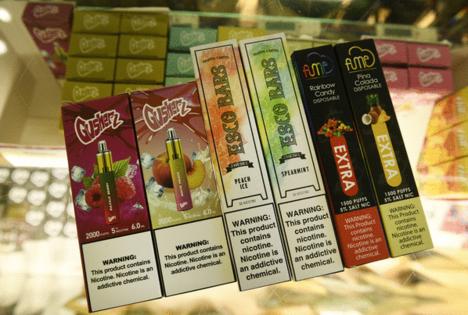Supreme Court backs FDA in flavored e-cigarette denials
Published in Political News
WASHINGTON — The Supreme Court on Wednesday upheld FDA actions to keep certain flavored e-cigarettes off the market, unanimously backing some of the agency’s approval process but sending an issue back to a lower court for further consideration.
FDA decisions have kept more than 1 million candy, fruit and other flavored e-cigarette products off the market nationwide. The two companies that challenged the FDA decisions, Triton Distribution and Vapetasia, sought approvals for flavors such as “Jimmy The Juice Man Peachy Strawberry,” “Iced Pineapple Express” and “Killer Kustard Blueberry.”
The FDA found that the companies had not sufficiently backed up their claims in the face of the risks of increased youth smoking from the flavors.
The justices were reviewing a lower court decision that ruled the FDA violated federal administrative law by misleading the companies about the scientific standards used for evaluation and rejecting their applications without even considering marketing efforts to discourage youth smoking.
Justice Samuel A. Alito Jr., writing for the court, said the justices must ask whether the FDA changed course and, if it did, whether it offered satisfactory reasons for the change. He described the agency’s guidance, which goes back as far as 2018, as having nuanced statements and an evolving assessment of relevant issues.
“Affected parties may have come away with the impression that the agency would apply a less demanding standard of proof than is evident in the denial orders the FDA ultimately issued, but in the end, we cannot say that the FDA improperly changed its position with respect to scientific evidence, comparative efficacy, or device type,” Alito wrote.
The court also sided with the FDA “for now” when it comes to the marketing plans, but it sent that issue back to the U.S. Court of Appeals for the 5th Circuit to decide again.
Under a 2009 federal law, the FDA prohibited a manufacturer from marketing any “new tobacco product” without FDA authorization, the Supreme Court wrote. The agency in 2016 deemed e-cigarettes to be tobacco products, which meant the products needed authorization.
Companies must demonstrate to the FDA that authorized products won’t harm public health. The FDA began stepping up oversight of flavored e-cigarettes as data showed youth were vaping at increasing rates and favored fruity flavors. In 2024, 5.9% of students — or 1.63 million kids — said they used e-cigarettes, according to data from the Food and Drug Administration. The vast majority of those used flavored e-cigarettes.
Data also showed youth vaping rates have dropped after the FDA began restricting the authorization of flavored products. The peak was in 2019 when 5 million kids reported using e-cigarettes.
The ruling comes amid mass layoffs at the FDA, including at the Center for Tobacco Products, which is responsible for reviewing applications for e-cigarette authorizations.
The case is FDA v. Wages and White Lion Investments.
©2025 CQ-Roll Call, Inc., All Rights Reserved. Visit cqrollcall.com. Distributed by Tribune Content Agency, LLC.




























































Comments